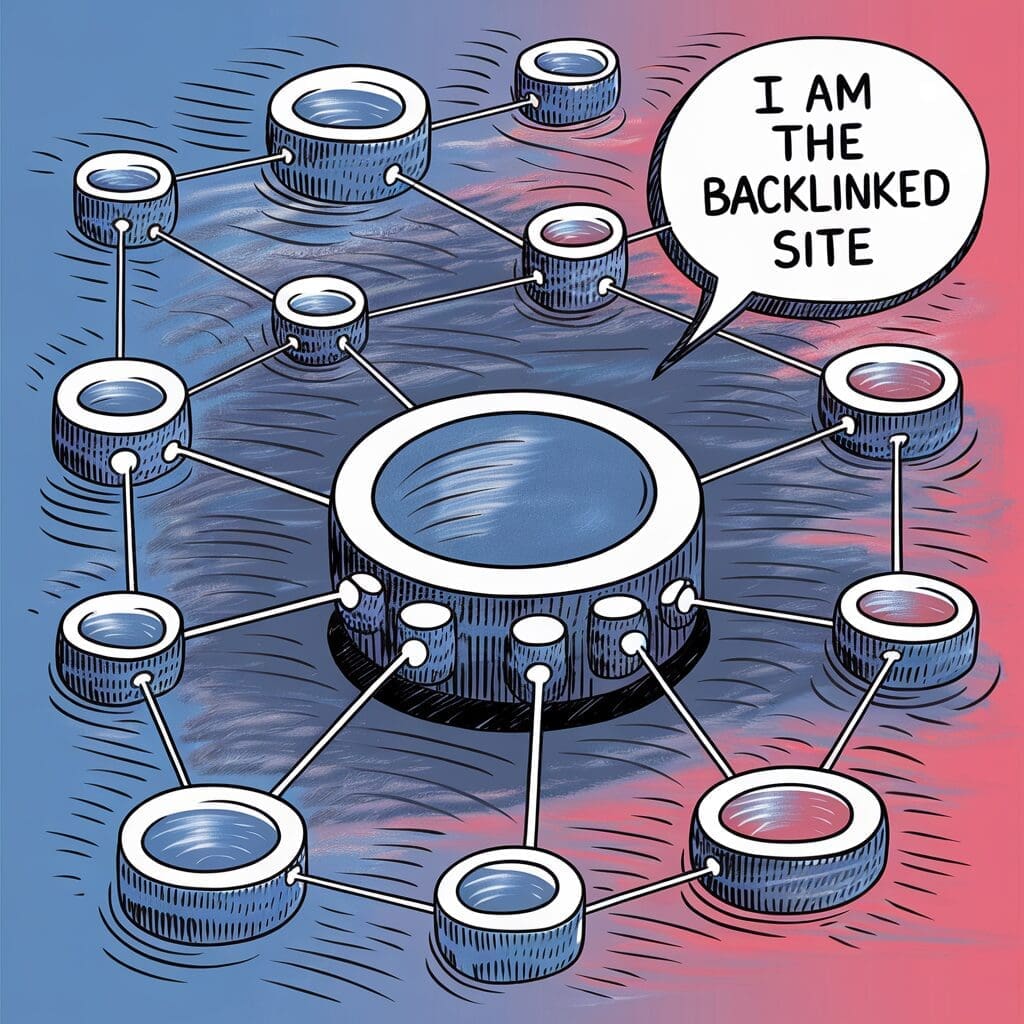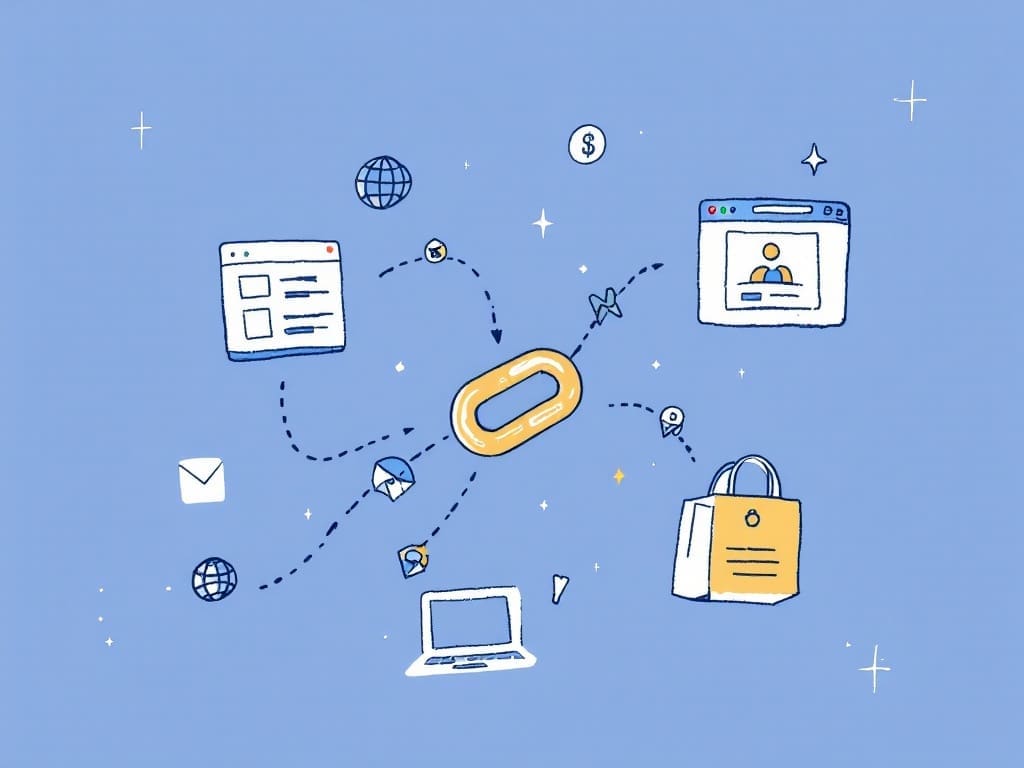If you are looking for an answer to, “What are backlinks and do they still help SEO?“, you’re in the right place.
When it comes to how well you rank in search engines, there are many factors which determine your position. Historically, two of the main ones were keywords and backlinks.
For a general overview of SEO, our guide below is a great place to start:
SEO Basics: The Simple SEO Guide for Website Owners [UPDATED]
What are Backlinks in SEO?
A backlink is simply a link from one website to another.
Think of it like a vote or recommendation – when a website links to your site, it’s like saying, “Hey, check this out!”

What is a backlink in SEO? A visual representation.
Editor’s Note [20.02.2025]: Our article titled “What Are Backlinks and Do They Still Help SEO?” was first published in 2017. While many of the fundamentals haven’t changed, search engine algorithms have continued to evolve. They’ve become smarter and more frequent, meaning it’s more important than ever to understand whether link building still works. Today’s update improves overall readability but also brings our advice up-to-date by mentioning Google’s latest stance on aspects like helpful content, web spam, and gaining “tust”.
Does Link Building Still Work?
Google, Bing, Yahoo, DuckDuckGo, and every other search engine has its own algorithms designed to return results for a search query.
Backlinks (and therefore link building) still play a role in these algorithms, but whether this is a positive or negative role is another question.
For example, when comparing Google vs Bing, you will see very different results due to their respective algorithms. They each pay different attention to link building and the importance of backlinks in determining rankings.
Regardless of the search engine, they each place the primary importance on being able to produce results that are relevant and authoritative.
This is even more so the case with Google’s latest guidelines on creating helpful content and its spam policies which try to deter from deceptive or manipulative SEO practices.
The name of the game in modern SEO is E-E-A-T (Experience, Expertise, Authoritativeness, and Trustworthiness). These are some of the “quality raters” that Google uses to help determine relevance and rankings, they therefore have a significant influence on SEO.
![Backlinks for effective seo - what are backlinks in seo & does link building still work? [updated] Backlinks for effective seo](https://b3714387.smushcdn.com/3714387/wp-content/uploads/2017/04/backlinks-for-effective-SEO.jpg?lossy=2&strip=1&webp=1)
Link building is an important part of an effective SEO strategy. Image via Pixabay.
The right kind of links can absolutely help with authority and trust. When a reputable website links to yours, it acts as a “trust signal“, reinforcing your site’s credibility in the eyes of both search engines and users.
In theory, this aligns perfectly with Google’s E-E-A-T principles and shows that your content is backed by experience, expertise, and authority.
But here’s the dilemma: Not all links are created equal. In fact, many websites unknowingly engage in practices which go against Google’s spam policies without even realising it. For example, the process of buying links (which includes paid guest posts, link exchanges, and sponsored placements), may all seem harmless enough, but can easily cross the line into manipulative practices that violate Google’s spam policies.
Is Buying Backlinks Safe? Do Paid Links Have a Place in Modern SEO? [UPDATED]
And when that happens? Google’s algorithms (or even a manual review) can devalue those links or, worse, penalise your entire website.
So, does link building still work? Yes, but only if done right. This means the focus shouldn’t be on “building” or “creating” links but on earning them naturally.

Does link building still work in SEO? Yes, if done genuinely by earning links.
This means acquiring links genuinely through creating useful content, a strong brand presence, and establishing authentic relationships with other sites.
The Rise & Fall of Backlinks in SEO
From the beginnings of search engines, backlinks have been valuable for successful SEO, so much so that it wasn’t long before the use of backlinks was being manipulated by many webmasters as a way of boosting their rankings.
Backlink Manipulation
The widespread use of backlink exchange programs, link networks and directories was quickly seen as a free market and the trade in backlinks began to skew the results for valuable keywords. As a result, the democracy of search engine results became corrupted and so did the reputation of the search engines providing those results.
In an effort to prevent this kind of manipulation, search engines began to use a system of authority to assess where a backlink came from, the authority of the backlink and its relevance. For example, backlinks from a foreign language site about SEO linking to a site written in English about shopping would raise alarm bells.
This meant that simply having a dusty backlink in several hundred low-quality directory sites was no longer enough to boost your rankings.
The Penguin Update in 2012
The Penguin algorithm update, first launched by Google in April 2012 then sought to clamp down on these kinds of manipulative link building practices and introduced penalties to discourage their use.
![Rise fall of backlinks with effective seo - what are backlinks in seo & does link building still work? [updated] Rise fall of backlinks with effective seo](https://b3714387.smushcdn.com/3714387/wp-content/uploads/2017/04/rise-fall-of-backlinks-with-effective-SEO.jpg?lossy=2&strip=1&webp=1)
Backlinks are an important part of building growth but staying in the rules is important. Image via Pixabay.
Since the initial Penguin update in 2012, Google has continually refined its approach to combating manipulative link building practices. Notably, in 2016, Penguin 4.0 was integrated into Google’s core algorithm, enabling it to assess links in real time.
This integration means that Google’s algorithms now continuously evaluate the quality and relevance of backlinks, to swiftly identify and neutralise link spam.
The SpamBrain Update in 2022
Google’s algorithms have become even more sophisticated.
The introduction of AI-based systems, such as SpamBrainin 2022, enhanced Google’s ability to identify manipulative linking practices with greater accuracy.
This means the risks attached to link building and the importance of adopting ethical, content-driven strategies are more important than ever for SEO.
Quality vs Quantity: Are Backlinks Even Needed?
The importance of link building (along with great content) is still considered to be an important part of a successful SEO strategy, but it is the quality and authenticity of your backlinks rather than the quantity that will determine your success.
Search engines want to reward trustworthy sites that achieve organic growth and positive user experiences with higher rankings, it’s as simple as that.
We’ve seen many instances where high-quality websites with very few backlinks can perform very well in search results and achieve a strong page 1 ranking.
That’s not to say that backlinks aren’t important. If nothing else, you need other websites to link to yours so that you can be found.
While backlinks are often discussed in the context of SEO, they serve several other essential purposes.
For starters, crawlability and indexation – search engines use links to discover new pages and understand site structure. If no other sites link to yours, Google and other search engines might take much longer to find and index your content. Internal linking plays a role here too, ensuring crawlers can efficiently navigate and understand your site.
Then there’s referral traffic. A backlink from a well-placed article, news site, or social media mention can drive real visitors to your website. Unlike organic traffic, which depends on search rankings, referral traffic can be a steady and consistent source of new visitors, regardless of algorithm updates.
It’s important that links like these are attributed properly to avoid potential penalties by using the Nofollow tag, more on this below.
Dofollow vs Nofollow Links & SEO: The Truth About the Nofollow Tag [UPDATED]
Links also help with branding and credibility. If a well-known website links to yours, it signals to users that your site is a legitimate source of information. Whether or not search engines count that link for SEO, users still trust recommendations from popular sources, making backlinks a valuable tool for brand awareness.
So, while SEO professionals may debate the ranking impact of backlinks, one thing is certain: links are still essential for web visibility, user discovery, and overall online success.
Talk to Opace
At Opace, we understand the importance of getting SEO right. If you want to know more about how a professional SEO team can boost your strategy, contact us today.
Please drop us a comment below or ping us on social media with your thoughts and opinions on link building. We are always interested to hear what others think!






0 Comments